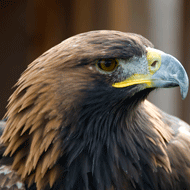
Campaign looks to raise the profile of persecuted species
A campaign is calling for the majestic golden eagle to be formally adopted as a national symbol for Scotland.
National history presenter and wildlife cameraman Gordon Buchanan has joined the RSPB campaign and has appealed to Scottish Parliament.
"The thrill of seeing a golden eagle soaring over a Scottish hillside is an unbeatable experience," he says. "For me they symbolise the wildest parts of our country and there is no other contender for Scotland’s national bird."
The golden eagle is already considered an emblem of wild Scotland and is used on company logos, at ancient burial sites and for place names. It would join the lion rampant, the Saltire and the Scottish thistle as emblems for the the country.
A recent poll saw 40 per cent of people vote for the golden eagle as the nation's favourite animal. Meanwhile, the red squirrel was the second most popular with 20 per cent of the votes, followed by red deer, the harbour seal and the otter.
According to the RSPB, there are currently just 431 pairs of eagles in the whole of Scotland. After centuries of persecution, the species has been almost completely confined to the country's more remote areas.
It is hoped that if the golden eagle is adopted as a national symbol, its profile will be raised, helping it to return to its former glory.
"The trouble is, golden eagles should and could be more common," Gordon adds. "Scots and visitors to Scotland shouldn’t hope that an eagle sighting is a once-in-a-lifetime experience; they should expect to see them regularly. That is why I’m backing the RSPB’s campaign to make Scotland’s national bird the golden eagle.”



 The Greyhound Board of Great Britain has published new vaccination guidance, with all greyhounds registered from 1 January, 2027 required to have the L4 leptospirosis vaccination, rather than L2.
The Greyhound Board of Great Britain has published new vaccination guidance, with all greyhounds registered from 1 January, 2027 required to have the L4 leptospirosis vaccination, rather than L2.